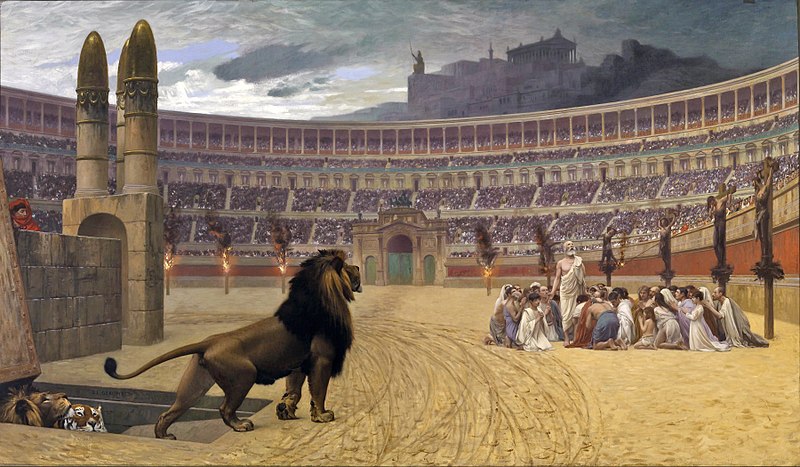This Sunday, the lectionary invites us to ponder John 3:1-21. The English Standard Version supplies the heading “You must be born again” to verses 1-15, and the heading “For God so loved the world” to verses 16-21.
In my column titled “The Serpent, the Son, and Nicodemus,” I explained the background to verses 14 and 15, which tell us that Jesus told Nicodemus that he, Jesus, must be “lifted up;” like Moses lifted up a bronze serpent,[1] in order for people to have eternal life.
In this column, I’ll focus on verse 3, which reads:
Jesus answered [Nicodemus], “Truly, truly, I say to you, unless one is born again, he cannot see the kingdom of God.”
As I said in my serpent column, John doesn’t tell us what Nicodemus asked Jesus. But John tells us Jesus mentioned the kingdom of God. It seems likely that Nicodemus wished to hear Jesus’ thoughts about the restoration of God’s kingship over Israel, “God’s chosen people.” [2]
God designed Israel to be a theocracy. God would be the king of the Israelites. His mediators, or go-betweens, would be prophet-generals and priests. Moses was the first prophet-general. Aaron was the first priest. Within a few decades, the prophet-general was called “judge.” [3]
But the Israelites clamoured for a king.[4] God granted their request.
About a thousand years before Jesus was born, God appointed Saul as the first human king of Israel. Things didn’t go well with Saul. After he died, God appointed David as the next king. The human kingship ended after about 400 years. [5] The last king of Judah was Zedekiah.
Zedekiah was deposed by the Babylonians. And the vast majority of Israelites, who came to be known as Jews, [6] were exiled from their homelands. [7]
A relatively small number of Jews returned from exile in Babylon to Jerusalem under the leadership of the priest Ezra and the patronage of King Cyrus of Persia. That happened 485 years before Jesus was born.
Ezra – and the overseer Nehemiah – rebuilt the Jerusalem Temple. But no one was appointed king of the Jews. This was because their nation remained under foreign rule. The foreign king appointed overseers, of whom Nehemiah was the first.
But the Jews always longed for a king. God had told them, through the prophets, that a king would come, and he would be from the line of David. If you want to know more, you can follow the link to my column titled “Just how bad was Herod the Great?”
The New Testament reports events which occurred in a colonial setting.
A setting ruled by a foreign king, Caesar.
A setting in which a small number of Romans, with local collaborators, dominated, exploited, and oppressed the “Jews,” including Jesus.
A setting in which a usurper, not from the line of David, got himself appointed king by Caesar in Rome.
That’s the background to John’s account of Jesus speaking to Nicodemus about the kingdom of God.
Nicodemus was expecting a king like David. Nicodemus was expecting a king who would free the Jews from oppression by the Romans. Nicodemus, like all of Jesus’ disciples, didn’t expect the new king to depose Rome using yeast as an “army.”
I am of course referring to Jesus likening the kingdom of God to yeast, which the English Standard Version translates as ‘leaven.’ It’s in one of many parables about the kingdom which Matthew collected. You can read them in the thirteenth chapter of his Gospel.
In 13:33, we read that Jesus said:
“The kingdom of heaven is like leaven that a woman took and hid in three measures of flour, till it was all leavened.”
What John has reported of the conversation between Jesus and Nicodemus is just a few lines. We don’t know whether Jesus discussed the “yeast mechanism” which he, the final king of Israel, would adopt.
What we do know is that Nicodemus didn’t get it. But he recognized Jesus as someone very special. He intervened for Jesus in a meeting of the Sanhedrin, and he honoured Jesus after his crucifixion by providing spices for Jesus’ burial – as I pointed out in my serpent column.
We live in a time of much warfare. Domestic and foreign wars are being waged in India, Myanmar, Rwanda, Gaza, Ukraine, Yemen, and more. What should churches and Christians teach and model?
Yeast works. Slowly. Irresistibly.
Jesus said the weapon of choice of born-again people, under his kingship, to overcome oppression, is non-violent resistance: patient, prophetic, loving resistance.
Nicodemus didn’t get it. Jesus said Nicodemus couldn’t see the kingdom of God because he wasn’t born-again. How about us? Can we see it? Are we born-again?
Peace be with you.
[1] Numbers 21:4-9.
[2] Deuteronomy 7:6.
[3] Othniel was the first judge. Judges 3:9-10.
[4] 1 Samuel 8:1.
[5] In 586 BC. Judah separated from Israel in about 930 BC, which is about 70 years after Saul became king.
[6] In Greek, loudaios. The Greek word has its roots in the Hebrew Yehudi. According to Merriam-Webster, the English word “Jew” was first used in the 13th century.
[7] They were deported in two waves. First in 597 BC and second in 586 BC.
To learn more about Rama, click here.


